| FOOD | |
| Ingredients for thrilling memoir | |
GROWING up in America, Alon Shaya was determined to shed his Israeli skin. His goal was assimilation.
But the award-winning chef later returned to his roots and has penned his story in Shaya: An Odyssey of Food, My Journey Back to Israel (Knopf). Interspersed with Alon’s favourite recipes, the book is a memoir taking in Israel, Americca and Italy, before he settled in New Orleans in 2003. “I opened an Israeli restaurant in New Orleans, called Shaya, after I reconnected with my identity,” Alon said. “I wanted to celebrate it and I was excited about it. The writing process really helped me. “Food was always my crutch and I started to sneak all kinds of Israeli food on to the menu at my Italian restaurant, Domenica, so it was really about honouring my heritage and my family history.” Alon was born in the Jewish State to an Israeli-Bulgarian mother and an Israeli-Romanian father. He moved to Philadelphia with his mother and sister two years after his father had moved to the American city. But, when he was five, his parents split up. Alon recalled: “I kind of began to associate food with happiness and family and when I was about seven, what really hit me was that I really loved food and that I connected it with my old life. “I found it tough trying to assimilate into a new country and trying to fit in. “I began to push my Israeli past aside so I could become a full-blown American. “When my grandmother came to visit, she would spend all her time cooking and I really connected with that sense of normalcy because my life was pretty unpredictable at the time. “There was a family dynamic which food was always a part of.” Alon went on to attend the Culinary Institute of America, in New York. And, while there, he started a Jewish culture club. “I got into a lot of trouble as a teenager — I was kicked out of Hebrew school and I didn’t have a lot of guidance,” he said. “I took a home economics class at high school and my teacher, Donna Barnett, who is my inspiration, got me my first job in a restaurant. “I set up the Jewish culture club because I wanted to explore my Jewish identity. “I had done everything I could to erase it because I wanted to fit in and I was embarrassed that I was different and that I came from somewhere different. “I had never thought of myself as being proud of being Jewish until I met Jewish friends at the institute. “I had peers who I felt really cared about me and I became really proud of being Jewish.” As a huge fan of Italian food, having worked in Italian restaurants in Las Vegas and St Louis, and a few months before he opened Domenica, Alon decided to move to Italy, spending time in Bergamo and Parma. “When people think of Italian food, many of them will think of the diluted American version of pizza and pasta, but there is so much more to its culinary tastes. “Working in Bergamo and Parma was where I truly understood the difference of Italy’s foods. “It was about understanding the reasons behind the food and what it meant to people.” Alon was also caught up in Hurricane Katrina, which devastated New Orleans in 2005. He stood on the streets, cooking red beans and rice and handing out foods to those residents whose lives had been ruined. “Doing that reminded me why I fell in love with food in the first place — to make people feel happy and bring comfort to them,” Alon said. “Leading up to Katrina, I wanted to be creative and cooked food which didn’t really make a lot of sense. “Doing what I did after Katrina changed my outlook on food.” He describes his new book as a memoir and a “journey to discover my identity and celebrate my heritage”. Alon continued: “Through the stories, I hope people will be able to relate their own experiences and that they will be inspired to cook the recipes because of the stories and not just because they need to make something for lunch or dinner.” He is also opening two Israeli restaurants in the next few months. Named after the Hebrew words for grandma and grandpa, Saba will open in New Orleans, while Safta will open in Denver, in Colorado. “It is my way of continuing to honour my grandparents,” Alon said.
Tabbouleh with Preserved Lemons & Almonds
THIS simplest of salads always surprises people at Shaya. “How can parsley salad be so complex?” they ask. The answer is twofold: preserved lemon and baharat. Taking the time to find (or make) these ingredients will pay off with flavour, although ¼ teaspoon of pumpkin-pie spice is a pretty good replica of the baharat, and freshly-grated lemon zest can stand in for preserved lemon.
|
